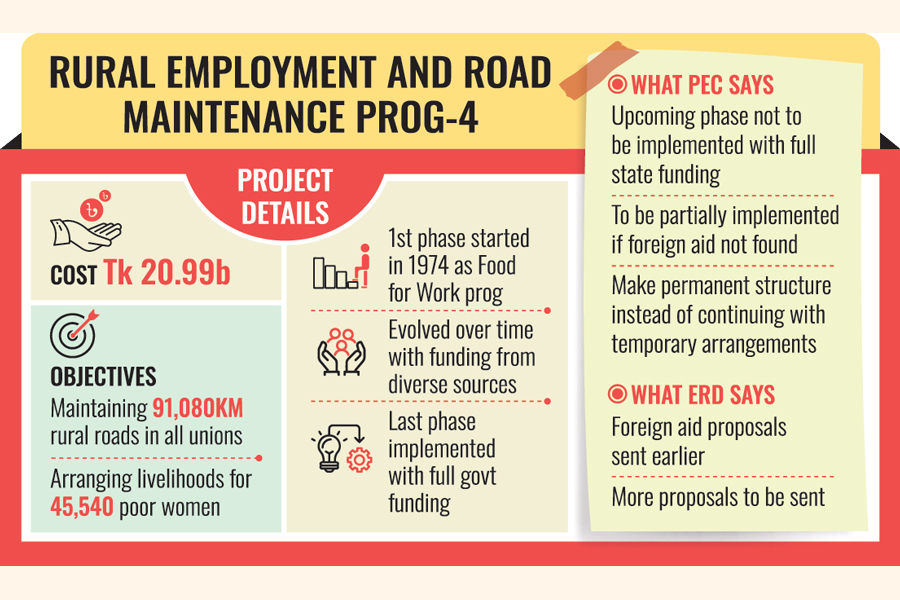
Published :
Updated :

The Planning Commission has sent back the Rural Employment and Road Maintenance Programme-4 proposal, a Tk 20.99 billion initiative to provide financial assistance for women by engaging them in rural road repairs in all unions across the country.
Instead of implementing the project solely with government funding, the commission has recommended securing foreign aid.
If foreign aid is not found, the commission has recommended implementation in selected areas based on the Climate Vulnerability Index (CVI), poverty index, environmental hazards, and financial capacity.
The recommendation came from a recent project evaluation committee (PEC) meeting organised by the Agriculture, Water Resources and Rural Institutions Division of the commission.
During the meeting, officials emphasised the need to establish a permanent structure for the initiative rather than continuing it with temporary project-based arrangements.
The programme has been continuing under such arrangements since the country's independence.
Dr Neyamat Ullah Bhuiyan, member (senior secretary) of the Agriculture, Water Resources and Rural Institutions Division, presided over the PEC meeting.
"For such support initiatives, a sustainable approach will be to increase bulk allocation for union parishads from the Local Government Division (LGD) under the Annual Development Programme (ADP)," he told The Financial Express.
"This will enhance the capacity of local governments and also create a permanent framework for women's empowerment and social protection by engaging poor women in villages in rural road maintenance," he added.
The LGD earlier sent the proposal for the project involving the maintenance of 91,080 kilometres of rural roads across the country. The project, to be implemented by the LGED, also aims at providing livelihoods for 45,540 underprivileged women.
Each woman engaged in the work will earn a daily wage of Tk 300, with Tk 100 to be paid in cash and the remainder deposited in her savings account through commercial banks, according to the proposal.
Officials said the Economic Relations Division (ERD) earlier looked for Tk 19.99 billion of foreign aid from various sources for the project. But it later finalised the proposal with full state funding as no development agency or country showed interest.
The project will enhance connectivity, improve livelihoods, and contribute to the greater goal of sustainable development, according to the documents.
Since its inception in 1974 as the Food for Work programme, the rural development initiative has evolved significantly, with CARE Bangladesh launching the Rural Maintenance Programme (RMP) in 1983.
A representative of the LGED mentioned at the meeting the RMP was first launched as a pilot in seven unions with support from the Canadian International Development Agency (CIDA). In 1984, the programme was expanded to 1,800 unions across the country with continued support from CIDA. Over time, it grew to cover 4,006 unions, excluding the haor and hilly regions.
Between 1995 and 2002, the project was jointly implemented by LGED and CARE Bangladesh. From 2003 to 2007, it received funding from the European Union (EU) while continuing the partnership with LGED and CARE Bangladesh.
From 2008 to 2013, the project was rebranded as the Rural Employment and Road Maintenance Programme (RERMP).
The subsequent RERMP-2 project, which ran from 2013 to 2018, was funded jointly by the EU and the Bangladesh government. RERMP-3 was implemented with full government funding between 2019 and 2024.
Dr Neyamat emphasised that instead of fully financing the project with government funds, it is essential to secure foreign assistance to ensure its successful implementation.
A joint chief of the Planning Commission said the project was included in the FY25 ADP as an unapproved one to facilitate the search for foreign assistance.
She noted that organisations, such as the Swedish International Development Cooperation Agency (SIDA), CARE Bangladesh, and the EU, provided support at various stages of the project in the past.
In light of the current economic challenges, she said it would be more appropriate to implement the project with the involvement of development partners.
ERD officials said they had earlier sent proposals seeking foreign aid for the project and more requests would be sent.
jahid.rn@gmail.com


 For all latest news, follow The Financial Express Google News channel.
For all latest news, follow The Financial Express Google News channel.